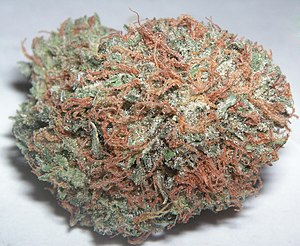
Kevin Ballinger owns Herb’s Medicinals in Berthoud, Colo. — a medical marijuana dispensary. In both personal and professional aspects, marijuana plays a large role in Dallinger’s life; more than just make his living off of it, Ballinger credits his marijuana consumption for making him an “asset to society” after an auto injury left him disabled 12 years ago.
So if anyone would be a proponent for legalizing marijuana it would be Kevin Ballinger, right? Not exactly.
Ballinger has issues with Colorado Amendment 64 — an amendment to the state’s constitution that would legalize the consumption and sale of marijuana for people over the age of 21.
“What I fear is the way they worded (Amendment 64) is incorrect,” Ballinger said. “They should have worded it ‘any resident of Colorado over the age of 21 can purchase,’ but now, the way they’ve worded it, it’s anyone over 21.”
Ballinger believes the legalization of marijuana sales to residents of other states will likely create a marijuana tourism industry in the state of Colorado, an industry that Ballinger believes will attract the attention of the Drug Enforcement Agency.
As Ballinger points out, even if Amendment 64 passes, marijuana sales and consumption would still be illegal under federal law. So for marijuana sellers — even those who abide by Colorado laws — the less attention drawn to their profession, the better.
But, from the perspective of one black market marijuana dealer, the positives of legalizing marijuana in Colorado outweigh the negatives.
“It’s a double edge sword, because there are good benefits; generate taxes, create new jobs, a new industry for study,” a CSU senior and marijuana dealer said.
The source, who has sold marijuana illegally for the past six years, agrees that marijuana tourism will likely increase if Amendment 64 passes, saying that he/she witnessed residents from other areas of the country flock to Fort Collins when the now-closed Fort Collins medical marijuana dispensaries first began opening.
“I know eight to 10 kids that moved out here from out of state to get their [medical marijuana] cards, grow pot and sell it back home, so [Amendment 64]’s definitely going to change the economy and population of Colorado,” the source said.
Up to half of the source’s business left when the dispensaries opened, and though they’ve been closed in Fort Collins since February 2011, many of the drug dealer’s clients have not returned. Instead, according to the source, his/her former clients began buying marijuana at dispensaries in Boulder and Denver.
Though the source also sees the wording of Amendment 64 as a potential problem, he/she is in favor of the Amendment’s passage, saying that legalized marijuana would be a boost to the state’s economy and keep many Fort Collins marijuana users’ funds from leaving the town.
Ballinger, whose business will be forced to close if Question 300 passes (the bill proposes to ban medical marijuana dispensaries in Berthoud) said he’s more focussed on 300 than 64 at the moment, and hasn’t yet decided if he will apply for a license to sell non-medicinally distinguished marijuana if 64 passes.
“I hesitate to say yes because here’s what’s going to happen; we would be the test state,” Ballinger said.
He said he’d like to see this honor go to another locale.
Colorado isn’t the only state with a marijuana legalization bill in play this election. Both Oregon and Washington may legalize the recreational use of the drug depending on the results of tomorrow’s election.
The latest polls from Public Policy Polling have the passing of Washington State’s Initiative 502, which would legalize the sale and consumption of marijuana, leading 53 to 44 percent.
“I would almost rather see it pass in Washington,” Ballinger said. “Let them be the test state and that would give us time to get everything in place.”
A senior at Western Washington University and former marijuana dealer in Bellingham, Wash., said that his/her state’s bill is also receiving criticism from pro-marijuana supporters, but for reasons other than those Ballinger cites for 64.
According to the Washington source — who opposes 502 — the bill would enact unnecessarily harsh punishments for driving under the influence of marijuana.
“I can say with 95 percent certainty that my habits won’t change from the law, but there’s that 5 percent chance that if those DUI laws are strict, and that if there are more varieties and better sources for (marijuana), it might switch up my routine,” the source said.
The source also believed that the bill was unnecessary, saying that the current marijuana economy in Washington is non commercialized, and social acceptance of the drug’s use continues to grow regardless of its legality.
To follow live coverage of the election, go here.





